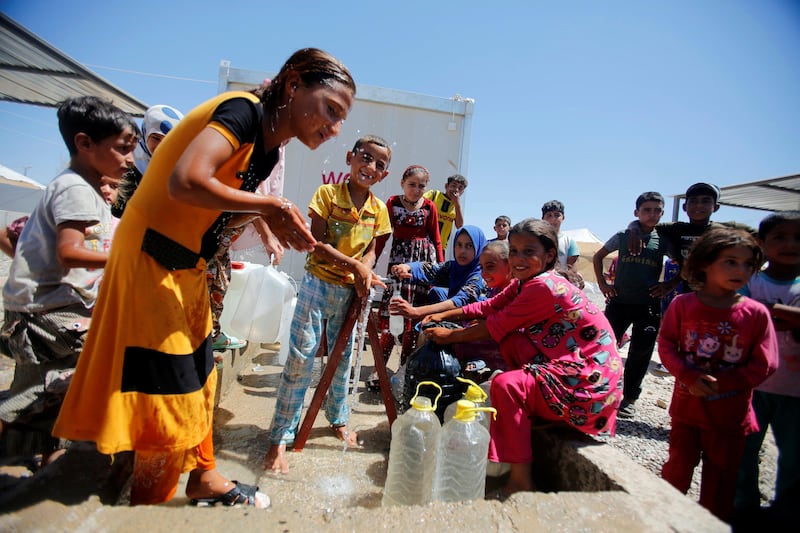Three years after the US started bombing ISIL positions to halt the extremist's advance, Iraqi forces and aid agencies are preparing for the last major battle to root out the remaining fighters from Tel Afar.
ISIL has controlled Tel Afar since 2014, and there are fears the operation to retake the town will stoke both sectarian reprisals in the area and tension among major powers in the region.
With the victory in Mosul complete, the US military has turned its air power against the militant positions in and near to Tel Afar, carrying out several strikes in recent days.
The United Nations said yesterday that aid providers were bracing for yet another evacuation of hundreds of thousands of civilians.
"Iraqis are poised to begin operations to recapture the towns of Tal Afar and Hawija, as well as the Euphrates valley in western Anbar province," said the UN's humanitarian aid co-ordinator for Iraq, Lise Grande. "By the end of those operations, several hundred thousand more civilians are likely to be displaced."
_________________
Read more:
Iraqi forces start military offensive against ISIL in Tal Afar
The liberation of Mosul: Victory at a price
_________________
She said UN teams were moving to areas close to operations in Tal Afar near Mosul, Hawija in Kirkuk province to the south-east and Anbar province.
Ms Grande confirmed that the teams were briefed in recent days about military "mustering points" and planned evacuation routes.
Of particular concern about the battle to retake the town is that it will ignite sectarian tensions. Much of the population is ethnically Turkmen, and a mix of Sunni and Shiite.
Prime minister Haider Al Abadi has said that the Shiite militias, the Hashed Al Shaabi, will be directly involved in the fighting.
Located on the road from Mosul to Syria, Tel Afar is also not far from Turkey and Ankara is watching closely how the battle will unfold with the Iran-backed militias playing a large role.
US coalition warplanes struck six "Daesh positions today in central Tal Afar," Musa Ali Julaq, commander of a Turkmen division of the Hashed Al Shaabi, said.
"We heard several massive explosions followed by a number of small ones as coalition warplanes struck [Daesh] arms depots," Mr Julaq told the Turkish Anadolu Agency.
"A French artillery battalion stationed near the Mosul Dam is now preparing to advance on Tal Afar to reinforce Iraqi troops already deployed in the vicinity," he added.
US Central Command said it had carried out six airstrikes around or close to Tal Afar on Tuesday. The US started its bombing campaign on August 8, 2014.
While the fighting is over in Mosul, Iraq's second-largest city, the humanitarian crisis in Mosul is not, Ms Grande said. "Nearly 3.3 million people remain displaced from their homes across Iraq, including 700,000 people from Mosul alone."
_________________
Read more:
Few wins for Mosul residents on city's Victory Bridge
Families of militants face threat of reprisals after defeat of ISIL in Mosul
_________________
The United Nations Office for the Coordination of Humanitarian Affairs (OCHA) estimates that more than 180,000 people are living in areas of Iraq still under the control of ISIL," said Kate Pond, OCHA's spokesperson.
According to OCHA approximately 70,000 people are in western Anbar governorate in western Iraq around the town of Qa'im, on the Euphrates close to the Syrian border, 65,000 in Hawija a district of Kirkuk city, 10,000 in Tal Afar city and 40,000 in its environs. On top of those figures, there could be a further 100,000 people displaced from those areas, OCHA said.
"People flee ISIL-held areas for safety every day, facing life-threatening risks. Humanitarian partners involved in managing displacement sites and camps report new families arriving from these areas on a daily basis. Over the last three weeks, camps close to Mosul received approximately 1,000 new arrivals from Tal Afar and Ba'aj every day. Since April, 49,000 people have fled Tal Afar district" said Ms Pond.
Those who flee their homes have to make their way to the UN's designated mustering points, from which they are transported first to screening sites and then to camps where humanitarian assistance is provided.
The camps and displacement sites are run by the government, the UN and its partner agencies. Others choose to shelter in host communities, where the UN and partners are also providing emergency assistance as access allows.
"Transportation of people from mustering points is organized and provided by the Iraqi authorities. By and large, people tend to flee the shortest distance possible, so people from western Anbar are largely sheltering in Anbar camps, people from Hawija are in Kirkuk and Salah Al Din, and people from Mosul and Tal Afar are in 19 camps and displacement sites close to Mosul," said Ms Pond.
Iraqi forces liberated Mosul from ISIL's control in July after nine months of fighting that caused the evacuation of more than 950,000 residents and left large swaths of the western half of the city in ruins.
Hundreds of thousands of Mosul residents have already returned to the city, she said, but aid agencies the number of displaced to increase to about 3.5 million as military operations unfold in the coming months"
A new wave of displacement would add to the complex protection and security challenges confronting Iraqi authorities and aid agencies as the battle against ISIL moves forward.
Meanwhile, Iraqi forces launched a large scale military operation against ISIL in Diyala province on Wednesday.
"Security forces and police, in cooperation with the Iraqi air force, carried out a massive manhunt for ISIL fighters in Hamrin mountains" said operations commander, General Mazhar Al Azzawi.
General Al Azzawi confirmed that the operation is aimed at rooting out ISIL sleeper cells in Diyala to prevent them from gaining a foothold in the province.






